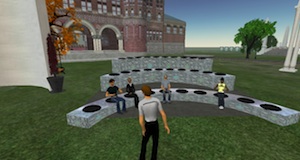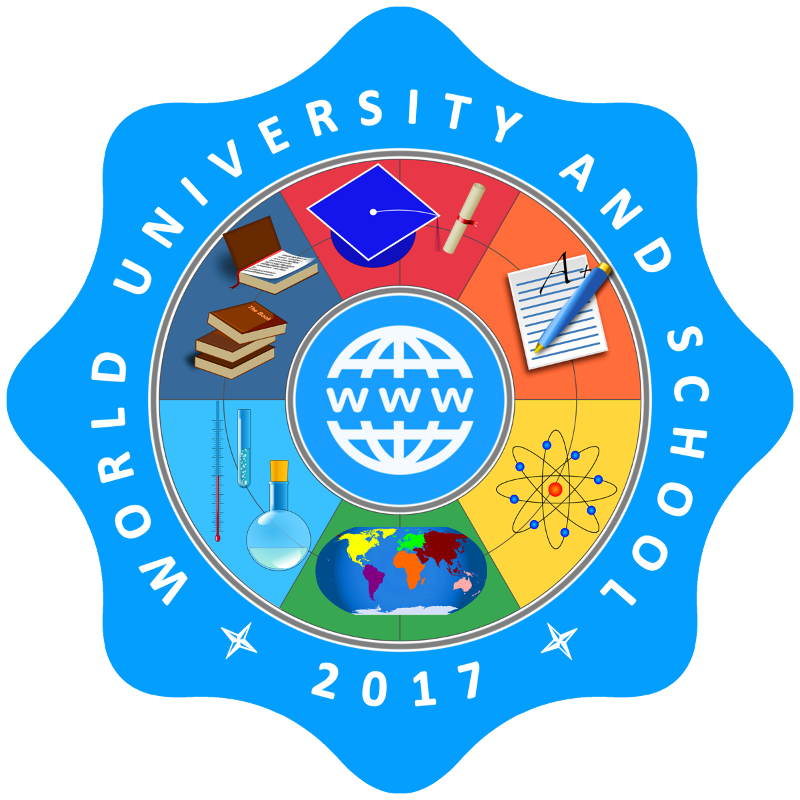World University and School
Society, Information Technology,
and the Global University
~
Course & Syllabus
~ Online in Zoom ~
~
This course asks:
What is information
technology, broadly conceived? How did it develop? Who did it? What has
been the process of diffusion into the economy and society? How and why
did the Network Society take shape? In this course, we’ll analyze the
interaction between society and contemporary information technologies,
in a multicultural and comparative perspective. In doing so, we’ll
examine what data and evidence are in the social sciences, how they are
used, and how they are interpreted. We'll also explore how this informs
the development of wiki MIT OCW-centric World University and School:
~ wiki.worlduniversityandschool.org ~
~
http://worlduniversityandschool.org/InfoTechNetworkSocGlobalUniv.html
~
Questions: sgkmacleod@worlduniversityandschool.org
http://worlduniversityandschool.org
WUaS Twitter - http://twitter.com/WorldUnivandSch

***
~ Free CC OpenCourseWare Course
"Information Technology, the Network Society,
& the Global University"
~ Group video talks and conversation / seminar
~
Taught "Society and Information Technology" on
Harvard's Virtual Island for nearly a decade ~
http://slurl.com/secondlife/Berkman/114/70/25
Google Streetview here ~
{in a virtual Harbin Hot Springs eventually}
***
Instructor: Scott MacLeod
(not on
Harvard's faculty) = Aphilo Aarde (in
Second Life)
http://scottmacleod.com
Welcome to the 'Information Technology, the Network Society and the
Global University' on Harvard's virtual island course web site, a
course about how the Network Society has developed, vis-à-vis long-time
Professor at UC Berkeley, UoSC, and University of Catalonia
(UOC), in Barcelona, Manuel Castells' research on the
Information
Technology revolution. In this course, we'll examine how the
Information Technology revolution represents a paradigm shift, as
significant as previous industrial revolutions, from an empirically
grounded analysis of the present. The argument for this course is that
information generation / processing is the driver of change in society.
The information revolution in the Internet Age comes from people
producing their information and exchanging it over the net, from the
double logic of identities and networks. We'll also draw on - https://wiki.worlduniversityandschool.org/wiki/Network_Society - (accessible from
http://worlduniversity.wikia.com/wiki/Internet_Studies) as well as
other
World University and School wiki resources.
This virtual course is 'placeless.' Talks and discussions will take
place both in group video in the first hour and in-world in the Meeting
Area on
Harvard's island in the virtual world of Second Life in the second hour.
***
*
***
Description of the course
This class is aimed at undergraduate students of all backgrounds and
interests. It does not require specific disciplinary knowledge and is
designed to be understood by any student with a general level of
information about society, politics, the economy, and international
affairs, regardless of the student's major. Interested graduate
students are welcome. A series of talks will analyze the interaction
between
society and contemporary information technologies, in a multicultural
and comparative perspective. Talks will cover 11 topics, which will be
subdivided
in specific themes. Specific required online media resources will be
assigned for
each topic.
Pre-requisites:
For non-sociology students; consent of the instructor.
Requirements:
Regular Participation. Engaging Required Media Resources.
*
SCHEDULE OF TALKS
(number between brackets indicate number of talks)
0. Introduction: Technology and Society (1)
1. The Information Technology Revolution: History, Geography, Actors
(Microelectronics, computers, telecommunications, genetic engineering)
(2)
2. The Internet Society: Social history of the Internet. The cultures
of the Internet. Virtual communities and sociability online. Social
movements, political conflicts, and the Internet. (4).
3. The New Economy: Technology and Productivity. E-business and the new
economy. Globalization: financial markets, international trade,
transnational production networks, internationalization of the labor
force. The new international division of labor: inclusion and exclusion
in the global networks of the new economy. (4)
4. The Digital Divide: (a) Technology, poverty, and minorities in the
U.S. (b) Inequality, poverty, and social exclusion in the Information
Age (c) The digital divide in a global perspective. (3)
5. The transformation of management, work, and employment: the network
enterprise, flexible work, and the individualization of capital labor
relations. (3)
6. Gender relations in the Information Age. (2)
7. The Informational City: information technology and spatial
transformation (2)
8. The New Media and the culture of real virtuality. (2)
9. Informational Politics and the Network State (2)
10. The new world disorder: war and peace in the Age of the Internet
(1) Conclusion: Technology and Social Responsibility (1)
11. Communication Power (1)
12. Global University, Wiki and Knowledge Generation (1)
REQUIRED MEDIA RESOURCES and READINGS
(Numbers refer to the topics in the program)
**
0. Manuel
Castells, with Harry Kreisler (Interviewer). 2003. Identity and Change
in the Network Society, with Manuel Castells (Conversations with
History). Berkeley, CA: University of California Television (UCTV).
Please watch video: https://www.youtube.com/watch?v=0GBB7U5mv0w
Please read transcript: http://globetrotter.berkeley.edu/people/Castells/castells-con0.html
**
1. Manuel Castells, "The Rise of the Network Society,” 2 nd edition,
Oxford: Blackwell, 2000, chapter 1: "The Information Technology
Revolution,” pp.28- 76
https://www.youtube.com/watch?v=FJIy6LpZLeI
Transcript:
http://socinfotech.pbworks.com/w/page/23323461/InfoTechSoc1
**
The
Information Revolution and Social Transformations
https://www.youtube.com/watch?v=Fj5cnr-xjJ0
Transcript:
http://socinfotech.pbworks.com/w/page/22857086/InfoTechSoc2
**
2. a) Janet Abbate "Inventing the Internet,” Cambridge: MIT Press,
1999, pages 1-6, 44-81, and 181-220.
b) Eric S. Raymond "The cathedral & the bazaar. Musings on Linux
and open source by an accidental revolutionary," Sebastopol, Ca:
O'Reilly, 1999, pages 7 - 78.
c) Turkle, Sherry. 2015. Stop Googling. Let’s Talk. September 26. New York, NY: http://www.nytimes.com/2015/09/27/opinion/sunday/stop-googling-lets-talk.html.
Transcript:
**
Internet
History - Scott MacLeod
https://www.youtube.com/watch?v=6VKh-22l-w4
Transcript:
**
Sociability,
the Internet & Empirical Data in the mid-late 1990s: Communities
& Individualization
https://www.youtube.com/watch?v=QKvSITu9XPg
Transcript:
**
The
Internet and Social Political Environments - MacLeod
https://www.youtube.com/watch?v=JNTVix681Ok
Transcript:
**
The
Internet and the Hacker Ethos - Scott MacLeod
https://www.youtube.com/watch?v=onjDjNNS3tE
**
3. a) Manuel Castells "Information technology and
global capitalism" in
Will Hutton and Anthony Giddens "On the edge. Living in global
capitalism," London: Jonathan Cape and New York: The New Press, 2000,
pages 52-74 b) David Held et alter "Global Transformations,” Stanford:
Stanford University Press, 1999, pages 189-282.
https://www.youtube.com/watch?v=I9awgJlZ93k
Transcript:
**
4. a) Manuel Castells "End of Millennium,” Oxford: Blackwell, 2nd
edition, 2000, chapter 2 "The rise of the fourth world,” pages 68-82
and 128-152
b) U.S. Department of Commerce, National Telecommunications and
Information Administration "Failing through the net: toward digital
inclusion. A report on American's access to technology tools,”
Washington DC: October 2000 (the whole report minus the methodology
appendix)
c) David Bolt and Ray Crawford "Digital Divide. Computers and Our
Children's Future,” New York: TV Books, pages 23-71
d) Manuel Castells "Information technology and global development,"
keynote address to the Economic and Social Council of the United
Nations, May 12, 2000 (text provided in class - available on-line from
the United Nations).
Please read transcript:
**
5. Martin Carnoy "Sustaining the new economy. Work,
family and
community in the Information Age," Cambridge: Harvard University Press,
2000, pages 14- 104
Please
read transcript:
**
6. a) Juliet Webster "Shaping Women's Work. Gender,
Employment and
Information Technology,” Harlow: Longman, 1996, pages 33-1 10, and 176-
192
b) Martin Carnoy "Sustaining the new economy,” pages 105 -151. 7. a)
William J. Mitchell "E-topia," Cambridge: MIT Press, pp. 31-68
b) James O.Wheeler, Yuko Aoyama, and Barney Warf "City space,
industrial space and cyberspace" in Wheeler, Aoyama and Warf (eds.)
"Cities in the telecommunications age," New York: Routledge, 2000,
pages 3-17
c) Andrew Gillespie and Ronald Richardson "Teleworking and the city:
Myths of workplace transcendence and travel reduction,” in Wheeler,
Aoyama and Warf (eds) "Cities in the telecommunications age,” 2000,
pages 228-248
Please read transcript:
**
8. a) Bruce M. Owen "The Internet challenge to
television,” Cambridge:
Harvard University Press, 1999, pages 197-333.
b). William Dutton "Society on the line. Information politics in the
digital age,” New York: Oxford University Press, 1999, chapter 10:
"Wiring the global village: shaping access to audiences,” pages 257-277
Please read transcript:
**
9. Manuel Castells, "The power of identity,” Oxford:
Blackwell, 1997,
chapter 5 "A powerless state?," pages 244-276 and 299-308, and chapter
6 "Informational politics and the crisis of democracy,” pages 309-353.
Please read transcript:
**
10. John Arquilia and David Ronfeldt "The emergence of
noopolitik.
Toward and American Information Strategy,” Santa Monica, CA: Rand
Corporation, 1999 (whole book, 89 pages).
Please read transcript:
**
11. Jan A.G.M. van Dijk. 2009. "Review of Manuel
Castells (2009),
Communication Power,"
Oxford, New York: Oxford University Press. (571 p.) ISBN
978-0-19-956-701-1. To appear in Communications, The European Journal
of Communication (2010)
http://www.utwente.nl/bms/mco/bestanden/CastellsCommunicationPowerReview.pdf
and Sy Taffel "Manuel Castells – Communication
Power" precis, May 31, 2010
https://mediaecologies.wordpress.com/2010/05/31/manuel-castells-communication-power/
Please watch video: https://www.youtube.com/watch?v=xoMam-oFOzY
Please read transcript:
**
12. Jimmy Wales. 2009. The Future of Free Culture: Jimmy Wales, Founder of Wikipedia. New Haven, CT: Yale University.Please watch video: https://www.youtube.com/watch?v=X9Vu69Ajtlk
Please read transcript:
**
"Information Technology, Network Society and the Global University"
See, too: http://scott-macleod.blogspot.com/search/label/society%20and%20information%20technology
Youtube channel with Scott MacLeod's videos above
https://www.youtube.com/playlist?list=PLof6LHEpLfwrYnYlQfwU119jDpOwfnZuN
World University and School
like Wikipedia with best STEM-centric C.C. OpenCourseWare
***
| Languages In all 9,000+ - each a Uni or Sch e.g. OCW Translated Courses:http://ocw.mit.edu/courses/translated-courses/WUaS Universal Translator:http://worlduniversity.wikia.com/wiki/WUaS_Universal_Translator |
Countries/Nation States All 242 - each a Uni or Sch (map) |
You at WUaS Admissions/Registering at WUaS for free, C.C., accrediting best STEM-centric OCW, online Bach., Ph.D., Law, M.D. and I.B. degrees e.g. OCW Audio-Video Courses:http://ocw.mit.edu/courses/audio-video-courses/ |
Subjects (Edit a page, Create, or Start a Subject at WUaS: SUBJECT TEMPLATE) |
Courses & Schools e.g. MIT OCW:
|
Music School at WUaS planned for all instruments, and for all languages as wiki; join a Google Hangout to real, real time jamming |
Library Resources |
Museums |
Hardware Resource Possibilities |
Educational Software |
Foundation at WUaS |
Best
STEM-centric OpenCourseWare Research |
***
Most of the above main WUaS pages are best STEM CC-4 OCW- and
great
universities-centric
and are planned for each of all 7,139+ languages and 200+
countries as wiki schools
- in big and small ways -
where you can openly teach and learn.
***
***
World University and
School at Guidestar.org affiliated with the IRS:
http://www.guidestar.org/organizations/27-3105368/world-university-school.aspx *** |
***
All content on this site -
http://worlduniversityandschool.org
- is freely available under a
Creative Commons Attribution-ShareAlike 4.0 license.
Creative
Commons' licensed
